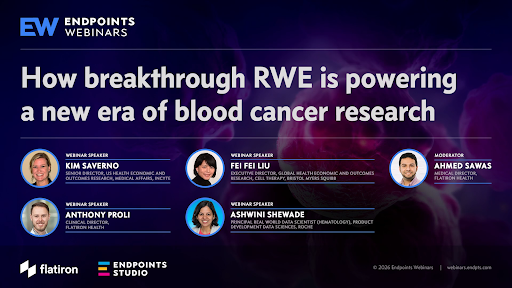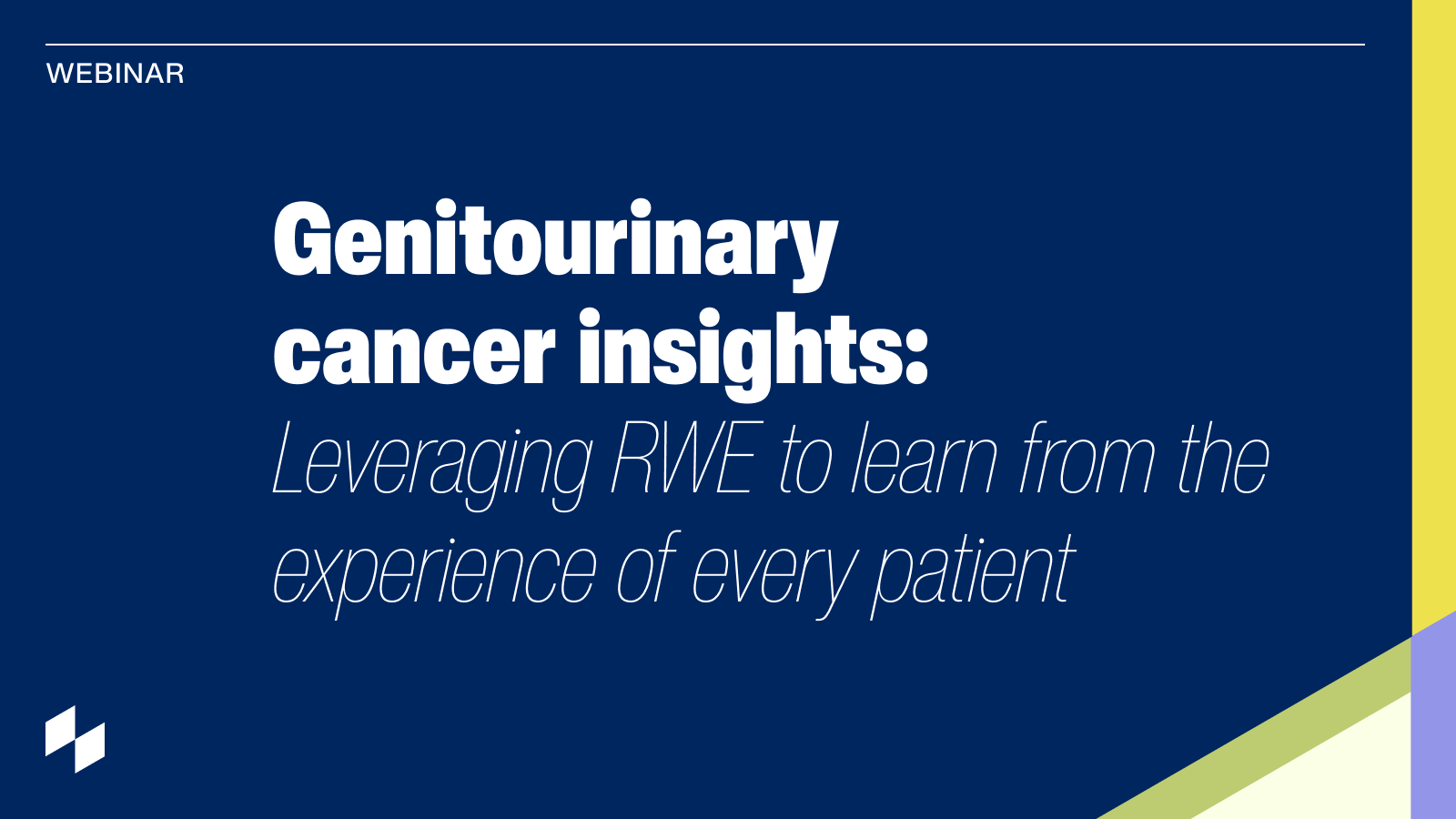This talk is part of the ResearchX session: The role of real-world data in tumor-agnostic drug development.
Sections include:
- Tumor site agnostic drug development: A genomics perspective
- Prevalence of TMB-H and association with survival in patients with less common solid tumors
- Characteristics and outcomes of real-world patients with MSI-H solid tumors treated with pembrolizumab
- Trends and challenges in tumor-agnostic drug development

Transcript
Tamara Snow: Great, thanks so much, Olivier. Hi, all, my name is Tamara Snow. And I manage the clinico-genomic data product for the Flatiron team. So today, I'm excited to talk through one of our earlier explorations into tumor-agnostic analyses using our clinico-genomic, pan-tumor dataset, and how this research not only demonstrated how a novel treatment approval is being used in the real-world setting, but also help guide how we're hoping to continue to improve our datasets, and analytical guidance to more easily unlock these tumor-agnostic analyses in the future.
So to start, I'll give some real context on the rationale for this study. So in May 2017, pembrolizumab monotherapy received the first tumor-agnostic, biomarker-based FDA approval in oncology for patients with mismatch repair deficient or microsatellite instability high or MSI-H tumors. This really was a groundbreaking approval based on a meta analysis of five single arm trials, which include approximately 150 patients diagnosed with 15 different cancer types.
This is my conflict of interest. I'm working in Merck. Next please. We all know that tumor mutation burden is an emerging clinical biomarker for response of immune checkpoint inhibitors. As you can see, from this bar graph, different tumor types, they have a different prevalence of a tumor mutation burden. And also you can see from the right hand at the plot, the higher tumor mutation burden associated with the higher overall response rates for immune checkpoint inhibitors in multiple variety clinical trials. Next please.
Given this new tumor-agnostic approach for therapy approvals, we thought it would be important to evaluate how this is translating into the real-world setting, specifically the use and effectiveness of this novel treatment paradigm. So for the study, we sought out to examine the characteristics and outcomes of real-world patients with solid tumors, identified as MSI-H via a FMI test, who had received pembrolizumab and monotherapy, after the FDA approval in May 2017. And to do so we leveraged our pan-tumor clinico-genomic data set to observe pembro use across the various histologies.
For this analysis, we used our Q1 2020 pan-tumor clinico-genomic dataset, which included 54,000 patients. To align with the approval, we limited it to patients that had an MSI-H solid tumor, and had started their first pembrolizumab treatment after their FMI test. And then within this cohort, we identified 148 patients with 36 unique FMI tumor types that received their first pembrolizumab monotherapy treatment after May 2017.
So one thing to note is that typically Flatiron derives line of therapies on a tumor specific basis. However, given the pan-tumor nature of this analysis, we had to derive a treatment block heuristic using our structured treatment data across tumor types. And this logic was really essential for us to identify patients with the pembrolizumab monotherapy line, as well as to describe the treatment sequencing in this pan-tumor cohort. And then in terms of the outcomes we evaluated were time to treatment discontinuation and overall survival.
Time to treatment discontinuation was defined as the time from first pembrolizumab administration or non-canceled order to last pembrolizumab treatment. And then overall survival was assessed from first time pembrolizumab administration or non-canceled order to the date of death or last activity date. Both of these outcomes were evaluated with Kaplan-Meier analyses across all patients in the cohort, as well as the largest tumor groups, which were colorectal cancer, endometrial cancer, and gastric or gastroesophageal junction cancer.
So moving on to the results, we looked at the baseline characteristics across the full 148 patient cohort, as well as by the largest tumor groups. So the overall cohort had a median age of 69 years, 65% were female and 78% had an ECOG performance status of zero to one around the time of pembrolizumab monotherapy start. This was slightly different from what we saw in the trial meta analysis, which had a median age of 55 years. 46% were female, and all patients had an ECOG of zero to one.
And then with regards to the genomic characteristics, 42% of patients had concurrent MMR alteration. And then the median tumor mutational burden was 32.2 mutations per megabase across all patients. Having this higher median TMB in this cohort was definitely expected, as prior research has shown a high overlap in high TMB and MSI-H tumors. But it was really interesting to see how it did vary a bit across the different tumor groups.
And then last thing to mention is that the median follow up time from pembrolizumab monotherapy start was about eight months. And not highlighted on here but just want to note that the median number of therapies prior to pembrolizumab monotherapy, was one across the cohort with approximately 60% receiving that pembrolizumab monotherapy line, in either the second or third line setting.
Great. So then in terms of the outcomes, the 12-month overall survival in the clinico-genomic cohort was 62% across all cancer types. And then when looking at the larger tumor groups, it ranged from 47 to 70%. And this is actually similar to the 12-month overall survival data that was subsequently published for the clinical trial cohorts, which show that for two of the five trials, patients demonstrated a one year overall survival greater than 70% for those with CRC and then greater than 60% for those with a non-CRC tumor type.
So what this really shows is that while the real-world cohort had slightly different baseline characteristics, such as being older or coming from a wider variety of tumor types than the pembrolizumab monotherapy trial cohort. It was really interesting to see that the one year overall survival rate across all patients in the largest tumor groups in the real-world cohort was consistent with the trial outcomes.
So in terms of the impact, from the clinical perspective, we really hope this study helps to inform how this first tumor-agnostic biomarker driven FDA approval in oncology is being translated into routine clinical practice and really helps validate the adoption of more precision medicine in cancer care. It was also a really great opportunity for us to provide supportive real-world evidence of the clinical trial data in a rare cohort where additional trials would be challenging to conduct.
And then from a real-world data perspective, this study really demonstrates the ability of the clinico-genomic database to evaluate these complex genomic biomarkers in a pan-tumor population, and also helps advance our understanding of how to design and execute these real-world pan-tumor analyses. So lastly, I just want to note some limitations about the study, and really our plans to address it through future work.
So first, unfortunately, at the time we ran this study, we didn't have our tumor-agnostic abstracted data model at scale, so we relied purely on structured EHR clinical data. And as such, some unstructured data elements like confirmation of date of diagnosis and stage were not available. In addition, our structured treatment block heuristic was definitely a minimalist approach to try to derive lines of therapy across this heterogeneous cohort, making it likely less robust than our tumor-specific line of therapy rules.
So in the future, what we'd love to do is rerun this analysis using our tumor-agnostic, enhanced or abstracted data model, which is now fully scaled as of last year. So we can leverage those additional clinical data elements to learn more about this cohort. And then another big goal for us in 2021, is to really advance our thinking on how to conduct these pan-tumor analyses and develop tumor-agnostic elements as needed to support them.
For example, further refining and validating our approach to pan-tumor lines of therapy. Great. Thank you so much for listening. I really appreciate your taking the time to listen to this study, and just noting that this was presented at ASCO 2020. So if you'd like a copy of the work, we're happy to share. Thanks.


